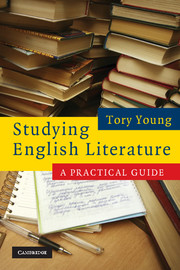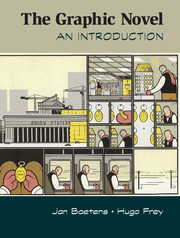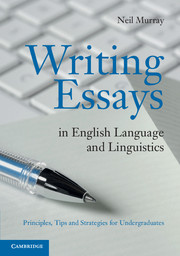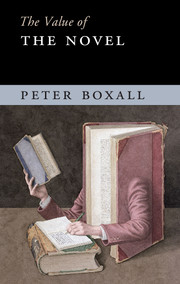Studying English Literature
A Practical Guide
- Author: Tory Young, Anglia Ruskin University, Cambridge
- Date Published: May 2008
- availability: Available
- format: Paperback
- isbn: 9780521690140
Paperback
-
Studying English Literature is a unique guide for undergraduates beginning to study the discipline of literature and those who are thinking of doing so. Unlike books that provide a survey of literary history or non-subject specific manuals that offer rigid guidelines on how to write essays, Studying English Literature invites students to engage with the subject's history and theory whilst at the same time offering information about reading, researching and writing about literature within the context of a university. The book is practical yet not patronizing: for example, whilst the discussion of plagiarism provides clear guidelines on how not to commit this offence, it also considers the difficulties students experience finding their own 'voice' when writing and provokes reflection on the value of originality and the concepts of adaptation, appropriation and intertextuality in literature. Above all, the book prizes the idea of argument rather than insisting upon formulaic essay plans, and gives many ways of finding something to say as you read and when you write, in chapters on Reading, Argument, Essays, Sentences and References.
Read more- All examples specifically chosen to be relevant to English Literature students
- The first three chapters cover what to do before you even start to write an essay - puts argument at the centre of the studying and writing process
- Shows students how to dissect a text and create an argument using practical but not patronising techniques and questions, e.g. folded paper dialogue technique. These accessible techniques and strategies relieve anxiety in students, which is half of the problem!
Reviews & endorsements
'An ideal course-book and companion. Full of practical tools and fresh insights, this is a book that not only shows how to read, research and write about English literature, it also explores why. Much more than a 'study skills' manual, it encourages a genuinely historical and theoretical grasp of the subject.' Professor Rob Pope, Oxford Brookes University
See more reviews'I've nothing but praise for this book: it's clear, well-structured, intelligent and most welcome in that it is subject specific and speaks to the UK university system. This surpasses all current introductory guides to studying English Literature.' Dr Matthew Woodcock, University of East Anglia
Customer reviews
Not yet reviewed
Be the first to review
Review was not posted due to profanity
×Product details
- Date Published: May 2008
- format: Paperback
- isbn: 9780521690140
- length: 181 pages
- dimensions: 230 x 150 x 10 mm
- weight: 0.3kg
- availability: Available
Table of Contents
1. Introduction:
1.1 What this book is about
1.2 Some practicalities: how to use this book
1.3 Reading and writing in your life
1.4 A very brief history of writing and reading
1.5 What do novels know?
1.6 Literacy in contemporary society
1.7 Stories, narrative and identity
Works cited
2. Reading:
2.1 Writing as reading?
2.2 A love of literature
2.3 The discipline of English
2.4 The new English student
2.5 Plagiarism: too complete a loss of self
2.6 How to read: ways of avoiding plagiarism
2.7 What to read
2.8 Some recommended websites
Works cited
3. Argument:
3.1 Having something to say
3.2 Rethinking dialogue: Mikhail Mikhailovitch Bakhtin (1895–1975)
3.3 Stories, arguments and democracy
3.4 The folded paper: how to stand at a distance and start a dialogue with a text
3.5 What is rhetoric?
3.6 A very brief survey of Classical rhetoric
3.7 Wayne Booth (1921–2005) and The Rhetoric of Fiction
3.8 More ways of discovering arguments
Works cited
4. Essays:
4.1 What are essays for?
4.2 What is an essay?
4.3 How do you think you write an essay?
4.4 The stages of writing an essay
4.5 Thinking of or about the question
4.6 Research
4.7 Making a plan
4.8 The thesis statement
4.9 Writing the main body of the essay
4.10 Beginnings and endings
4.11 Editing
4.12 Finally, a frequently asked question: 'Is it OK to use 'I'?'
Works cited
5. Sentences:
5.1 The most common errors made in student assignments
5.2 Errors involving clauses
5.3 Errors involving commas
5.4 Errors involving apostrophes
5.5 Errors involving pronouns
5.6 Errors involving verbs
5.7 Errors involving words
Works cited
6. References:
6.1 The MLA system
6.2 Citations in the MLA style
6.3 Quotations
6.4 Bibliographies and works cited in the MLA style
Works cited
Appendix: Sample essay by Alex Hobbs.Instructors have used or reviewed this title for the following courses
- Grammar & Composition
- Interpretation of Fiction
- Introduction to Literary Studeies
- Literature in Theory and Practice
Sorry, this resource is locked
Please register or sign in to request access. If you are having problems accessing these resources please email [email protected]
Register Sign in» Proceed
You are now leaving the Cambridge University Press website. Your eBook purchase and download will be completed by our partner www.ebooks.com. Please see the permission section of the www.ebooks.com catalogue page for details of the print & copy limits on our eBooks.
Continue ×Are you sure you want to delete your account?
This cannot be undone.
Thank you for your feedback which will help us improve our service.
If you requested a response, we will make sure to get back to you shortly.
×



